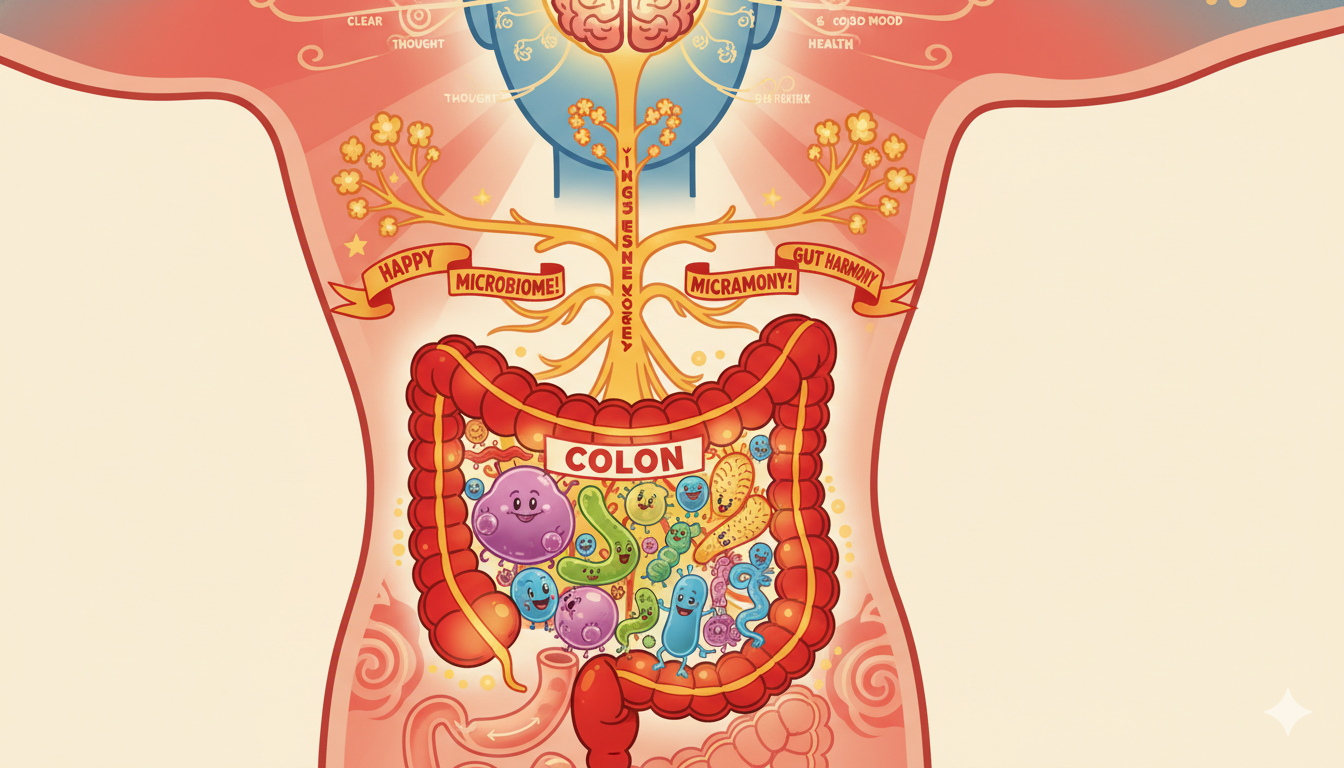Check requirements for Asia's Retirement Visas
How Does Gut Health Affect Aging? The Science of Longevity in Your Belly
Uncover the gut-aging link! Learn the science of how your microbiome controls inflammation, brain health, and longevity. Start optimizing your belly for a longer life.
USEFUL MEDICAL KNOWLEDGE
11/12/20253 min read


The Secret Life of Your "Second Brain"
Have you ever wondered what the actual, non-metaphorical fountain of youth looks like? It turns out, it’s not a shimmering spring in a hidden valley—it’s a dynamic, microscopic ecosystem thriving deep within your digestive tract.
For years, we thought of the gut as a simple waste-disposal system. Now, scientists know your gut microbiome—a trillion-strong community of bacteria, fungi, and viruses—doesn’t just process your lunch; it actively codes for your health, your mood, and most incredibly, how fast and how well you age. If you’ve ever felt "butterflies" before a big meeting, you’ve experienced the gut-brain axis in action. Now imagine that constant communication deciding your longevity.
So, how exactly does this bustling microbial city in your belly hold the key to a longer, healthier life? Let's dive into the science of why your gut is the new frontier in healthy aging.
The Three Pillars of Gut-Centered Longevity
The connection between your gut and your biological age rests on three powerful, scientific concepts:
1. Battling the Chronic Flame: The ‘Inflammaging’ Link
Aging isn't just about wrinkles; it's about a chronic, low-grade, systemic inflammation that scientists call "inflammaging." It’s a quiet fire that damages cells and accelerates age-related diseases like Alzheimer's and heart disease.
Where does this fire start? Often, in the gut. When the gut lining (the intestinal barrier) is compromised—a condition sometimes referred to as “leaky gut”—undigested food particles and bacterial toxins can slip into the bloodstream. This triggers a perpetual alert state for your immune system, fueling inflammaging.
Data Point: Research published in Nature Metabolism in 2021, tracking over 9,000 adults, found that older adults with less diverse gut microbiomes were nearly twice as likely to die during the study period compared to those with unique, healthy microbial patterns. A healthy gut keeps the barrier strong and the flame low.
2. The Power Metabolites: Short-Chain Fatty Acids (SCFAs)
Your gut microbes aren’t just sitting around—they are working mini-factories. When they break down prebiotic fiber (the complex carbohydrates your body can't digest), they produce vital compounds called Short-Chain Fatty Acids (SCFAs), primarily Butyrate.
Butyrate is a superstar molecule. It:
Feeds the cells lining your colon, keeping your gut barrier intact.
Travels throughout the body, acting as a powerful anti-inflammatory agent.
Is linked to better immune function and metabolism—two keys to healthy aging.
A decline in SCFA-producing bacteria, like Faecalibacterium prausnitzii, is a common feature of aging in less healthy individuals, according to a 2024 review in Gut Microbes. Super-agers (centenarians), conversely, often have robust SCFA production, demonstrating its link to exceptional longevity.
3. The Diversity Dividend: Why More is Better
Think of your gut microbiome like an investment portfolio. If you only invest in one stock, you're at high risk. If you invest in hundreds of different funds, you're resilient.
Healthy young adults have a diverse gut microbiome—a wide range of bacterial species working together. As we age, this diversity often declines, especially in those with declining health. However, a landmark 2017 study from researchers at Western University found that the gut microbial composition of exceptionally healthy elderly individuals was strikingly similar to healthy 30-year-olds.
This tells us that a diverse, robust gut community isn't just a byproduct of good health—it might be a biomarker for it. When I was younger, I thought taking a multivitamin was all I needed for health, but it was only after realizing my diet needed to nourish the trillions of living residents in my belly that I truly felt the difference. The goal isn't just to live longer, but to sustain that diverse microbial workforce for the long haul.
Simple Steps to Nourish Your Longevity Bugs
The great news is that you have significant power to influence your gut community.
Eat the Rainbow (Fiber First): Focus on a high-fiber, plant-rich diet. Foods like beans, lentils, whole grains, and a variety of colorful fruits and vegetables are the "prebiotics" your beneficial bacteria crave to produce those essential SCFAs.
Invite the Allies: Regularly incorporate fermented foods—yogurt, kefir, sauerkraut, kimchi—to add beneficial probiotics (live bacteria) to your system.
Manage Your Stress: The gut-brain axis is a two-way street. Chronic stress can negatively alter your microbiome composition, so practice stress reduction through mindfulness or gentle exercise.
Your gut is not just a tube; it is the ultimate health moderator, a biological hub that connects your diet, your immune system, and your mental clarity to the pace of your aging. Take care of your residents, and they will take care of your longevity.
What is your favorite fermented food? Share your longevity tips! Read more on Kimchi, Konucha and Kefir and how they improve your gut health.
Nutritious cooking suitable for Seniors as we age.
Knowing nutrition for healthy aging.
Disclaimer: This article is for informational purposes only and does not constitute professional advice.

Address
Blk 8 Cantonment Close
SIngapore